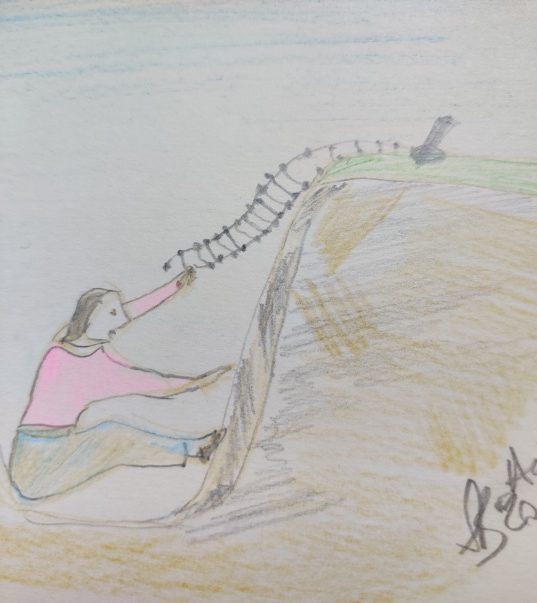Over the last three weeks I have been attending a course, ‘Unleashed’, being run by a friend Blanca Vergara. The first session included an hour’s break-out room discussion to address a key question – what is your fear?
I sat with two others, who agreed with me – ‘I am stuck’ we said in chorus.
I am writing this for my two fellow travellers. How might we be dealing with being ‘stuck’?
1. Turn your feelings into words – why are you ‘stuck’?
With a clear set of words as to why you are stuck, you are more likely to make a change.
In management theory we will say – first articulate the exact nature of the risk – what might change, do you fear, as a result of changes in the process? What likely effect, when anticipated, gives you a feeling of ‘risk’ or potential problem? (This helps to categorize the risk).
For us, at a personal level the question is: Why are we getting in our own way? Why can’t we move forward, seemingly? If you want to self-assess your current mood, the NHS offers this service.
Each of us said something specific was the cause of our discomfort. Specific, in my mind is ‘good’. Connecting an actual word or set of words with what you think creates a connection in your brain – there is neuroscience backing this up – it is creating a direct link to a part of the brain which helps with goals and planning (i.e., your pre-frontal cortex).
2. Do your preparation – support yourself with self-care – otherwise your brain will simply refuse to cope with any change
- What you need is sufficient sleep, first of all;
- Eat healthily and check out where in your body you feel ‘stuck’ – I do this set of stretches; flex the areas that are stiff. (5 minutes)
- Ensure you are well-hydrated.
If your being stuck is at the forefront of your mind, and you are not sleeping well, it’s probably not the best time to start on changing something fundamental – more constructive to start with the body, and take it a step at a time, so improving self-care is really a very important pre-requisite.
Do something small every day. The ‘every-day’ part of this is really important. Go to bed earlier on a day when you have changed the sheets. Luxuriate a while – have a bit of ‘me-time’ – read a known poem or passage from a book which you know uplifts you. Pray, if that is you. Wish everyone you know well. Sleep well.
Another day of the week, make sure you do a whole day’s water therapy. This is making a jug of water easily available to yourself (so at your desk, if you are there most of the day) into which you have dipped some fresh fruit or cucumber, or lemon – make it a nice flavour you will enjoy. Enjoy it at optimum temperature for you. Let the fruit infuse – drink it slowly.
If you have positive initial experiences of behaviour change, then you are more likely to accomplish them. (Neal et al) [1]
It is not ‘feminine idling’ as I once heard it called.
It is practical preparation.
3. What will you use as a useful trigger to ‘do something different’? Planning a trigger that works for you

Research shows that changes stick more easily when they are coupled with a regular trigger or cue such as ‘before a meal’, or ‘just after brushing your teeth’.
So, if there is something you want to change, and you have a process in mind, you need to see what exactly you will interrupt, to insert the action you need to do, to bring about the change.
4. Destination and its definition
Before I start work on a change process in any organisation, I always ask everyone involved ‘what will good look like, for your department, after this change?’ Ask that of yourself – By the time you finish up, what would the result of this ‘getting unstuck’ look like for you?
When I joined Blanca’s Unleashed course, I asked what would ‘good look like’ afterwards?
Here is my list:
- If I discover something about my past that I have not confronted, then that would be a great plus. I wanted to be able to articulate why I feel I am ‘stuck’. I have been ‘stuck’ before, and moved along – I want to do it again.
- If I can genuinely participate and provide positive feedback to her, then it will have been worth doing.
- Attending this beta training on Zoom, I will know what a participant’s experience looks and feels like, in a virtual environment. I want to discuss my own book and e-learning courses content, in such a forum –would this be suitable?
Ordinary ‘marketing’ simply makes me cringe. This seems more exploratory.
This course is full of educated women entrepreneurs, in transition, from all over the world.
There is a lesson emerging – what makes us human and alike is so much bigger than what makes us ‘foreign’ and different. In this international classroom experience we are creating ‘common ground’.
The last book in my series will be about creating common ground in families, schools, societies and nations.
[1] Neal, D.T., Wood, W., & Quinn, J.M. (2006). Habits – A repeated performance. Current Directions in Psychological Science,15, 198–202.
